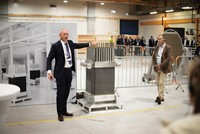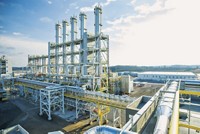Advertisement
Grab your lab coat. Let's get started
Welcome!
Welcome!
Create an account below to get 6 C&EN articles per month, receive newsletters and more - all free.
It seems this is your first time logging in online. Please enter the following information to continue.
As an ACS member you automatically get access to this site. All we need is few more details to create your reading experience.
Not you? Sign in with a different account.
Not you? Sign in with a different account.
ERROR 1
ERROR 1
ERROR 2
ERROR 2
ERROR 2
ERROR 2
ERROR 2
Password and Confirm password must match.
If you have an ACS member number, please enter it here so we can link this account to your membership. (optional)
ERROR 2
ACS values your privacy. By submitting your information, you are gaining access to C&EN and subscribing to our weekly newsletter. We use the information you provide to make your reading experience better, and we will never sell your data to third party members.
Economy
Europe to boost output of electrolyzers for hydrogen
Twenty firms agree to tenfold increase in production
by Alex Scott
May 11, 2022
| A version of this story appeared in
Volume 100, Issue 17

The European Commission and 20 companies, including Bosch, Siemens, and Topsoe, have signed a joint declaration to increase European electrolyzer manufacturing capacity tenfold to 17.5 GW annually by 2025 and to further increase capacity through 2030. When powered by renewable energy, an electrolyzer splits water into oxygen and renewable hydrogen.
A tenfold increase in electrolyzer capacity would put the region on course to produce 10 million metric tons (t) per year of renewable hydrogen by 2030, the Commission estimates. This is double the amount of such hydrogen the region had previously planned to make as an energy source and raw material for chemical production. Europe also plans to import 10 million t of hydrogen annually by 2030.
To support the production increase, the Commission has agreed to introduce regulations that ease access to financing.
By boosting renewable hydrogen capacity the Commission hopes to accelerate Europe’s shift away from Russian natural gas as an energy source. “Russia’s unprovoked invasion of Ukraine has strengthened the case for the green transition to reduce Europe’s dependency on Russian fossil fuels,” the declaration says.
The European Clean Hydrogen Alliance, an industry group, plans to bring electrolyzer manufacturers together with suppliers of components and materials in a bid to ensure the industry has access to the raw materials it needs. Some of the raw materials for electrolyzers are also in demand for use in other zero-carbon technologies such as lithium-ion batteries.
“This represents both an unprecedented challenge and a significant opportunity for Topsoe,” Topsoe CEO Roeland Baan, one of the signatories of the declaration, says in a press release.




Join the conversation
Contact the reporter
Submit a Letter to the Editor for publication
Engage with us on Twitter